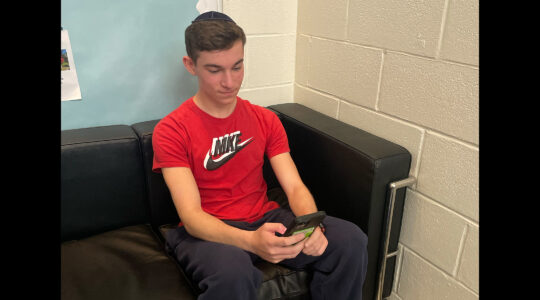
Tracey Erin Smith stars in “The Burning Bush,” a one-woman show in which she plays a rabbi turned stripper trying to teach Kabbalah through Madonna lyrics. (Emily Cooper)
LOS ANGELES (JTA) — 1play \ˈplā\ n.: Fun relaxing activity or a stage performance.
At the New Vista Theatre in Fort Lauderdale, Fla., the bearded and paunchy Avi Hoffman, looking somewhat rabbinical, walks across the stage and sings, to the tune of Paul Simon’s “Still Crazy After All These Years”:
I saw my old rabbi in the shul last night/
and we talked about our illness and complained about our fears.
Still Jewish after all these years. Oy!/
Still Jewish after all these years!”
At the Traveling Jewish Theatre in San Francisco, a beleaguered 40s Brooklyn housewife, Enid, laments the men in her life (and her life): her cheating, gambling husband; her truant son; and his brother, a stuttering mess who hides behind magic tricks. “I don’t nag, I encourage. He’s weak!” she says in Woody Allen’s “The Floating Light Bulb.”
And at Theatre 3 in New York City, Tracey Erin Smith plays a rabbi-turned stripper in a one-woman show trying to teach Kabbalah through Madonna lyrics in “The Burning Bush”:
“Take ‘Like a Virgin.’ Imagine here Madonna is singing to God — or, if you’re not comfortable with that word, you can think of it as the universe, or nature, or ‘all that is.’ In ‘Like A Virgin’, she says, and I quote from The Book of The Immaculate Collection, Track 4, Verse 1:
I was beat, incomplete
I’d been had, I was sad and blue
But You (God, or whatever)
You made me feel
Shiny and new!”
There it is, the panoply of Jewish theater across the country, running the gamut from schmaltzy to risqué, with Woody Allen in the middle.
What exactly is Jewish theater?
This month, the Jewish theater community found at the Festival of Jewish Theater and Ideas, which ran through June 14 in New York, with some 20 performances ranging from documentary theater, puppet theater, commedia del’arte, one-person shows, Yiddish theater, Israeli theater, midrash and cabaret. They covered subjects such as family life, historical figures and, of course, religion (or lack thereof).
The festival culminated in the Association for Jewish Theatre’s annual four-day conference, drawing playwrights, directors, monologists, actors and theatergoers. This year’s theme was “Theater of Ideas and Beyond,” with guests, including Israel Horovitz, Donald Margulies, Murray Schisgal, and Itamar Moses.
Jewish theater people at the conference (and those across the country not attending due to economics or because their own shows are in production) may not agree on much: What constitutes Jewish theater? Who is the target audience for a Jewish theater? How will Jewish theater survive these tough economic times?
But the one thing they do seem to collectively hold true is that Jewish theater is essential to Jewish identity.
For some, Jewish theater means to celebrate being Jewish; for others, it’s a way to send up being Jewish. In today’s confessional-reality TV-twitter-memoir obsessed society, Jewish theater is a way to explore personal issues of spirituality, family, history and connectedness. And for most, Jewish theater, like all theater, is the place to explore ideas that can only be dealt with in one place: on stage.
“I feel like when people hear about Jewish theater, they think, ‘Fiddler on the Roof,’ or ‘Irina’s Vow,’” said Ed Einhorn, the artistic director of Untitled Theater Company #61, which hosted the festival.
“It’s not that they’re not interesting pieces on their own,” Einhorn said, “but they’re not everything.”
But for some — especially of the older generations — this type of hokum (the American word for schmaltz?) is everything.
“It’s great to be Jewish,” said Hoffman, of “Too Jewish,” “Too Jewish Too” and “Still Jewish After All These Years,” a three-part one-man retrospective of life growing up around the glory of Jewish theater, comedy and song. “I want people who walk out of my shows feeling like they have learned something, that they have been entertained completely, and, if you are Jewish, you end up feeling ten feet tall, so proud of your heritage.”
Yet for the post-Yiddish-theater, post-Catskills generation, that kind of insider, self-congratulatory theater — and its close cousin, insider mockery like “Modern Orthodox” and “Jewtopia” — is not what Jewish theater is supposed to be.
“There’s a lot of good, safe, mainstream theater that reflect Jewish ideas and themes,” said Andrew Horwitz, editor of Culturebot.org and the director of strategic partnerships at the Foundation for Jewish Culture.
But, he added, it’s harder to find theater that “challenges our conventional narrative about what being Jewish is, and what theater is.”
“When most people go to theater, it’s a very safe experience. A lot of theater is not much more than staged television. It’s pretty conventional,” Horwitz said.
To illustrate examples of boundary-breaking theater, Horwitz pointed to two productions that receive support from the FJC-affiliated, UJA Federation of New York-funded Six Points Fellowships program: Dan Fishback’s “You Will Experience Silence,” a six-character play that explores the relationship between citizen and empire in modern America and Maccabean-era Judea; and “Fabrik: The Legend of M. Rabinowitz,” which uses puppets and masks to tell the story a Polish Jew who immigrated to Norway at the turn of the century in order to escape pogroms and persecution.
Horwitz marveled at periods of vibrant Jewish theater, as seen in “Chagall and the Artists of the Russian Jewish Theater, 1919-1949,” an exhibit at The Contemporary Jewish Museum in San Francisco through Sept. 7.
“There was this moment in time when you had this extraordinary confluence of playwrights, actors, musicians, and writers making startlingly avant-garde work about the Jewish experience at the dawn of the modern world,” Horwitz said. It’s instructive that “this passionate, creative impulse was destroyed by the Holocaust. We have a responsibility to reinvent that — not just recreate what’s on TV. How can we re-imagine theater?”
One Jewish theater group is successful, producing new and original plays on topical and challenging subjects. Theater J, at the Washington D.C. JCC, is an equity theater that produces five to eight shows per year, five nights a week, selling up to 30,000 tickets annually — mostly to the 55-plus crowd.
“Our mission is about reclaiming the urban voice and cultural vision of the Jewish legacy,” said Rebecca Ende, Theater J’s director of marketing and communications. Next year’s season includes standards like Neil Simon’s “Lost in Yonkers,” but also Hadar Galron’s “Mikveh,” an Israeli play inside the world of the ritual bath, and Winter Miller’s “In Darfur,” about the genocide in Sudan. Group discussions and panels often follow the performances so there’s a “forum for Jewish and non-Jewish audiences to come together and explore ideas and issues relevant to the Jewish community,” Ende said.
This year Theater J featured “Honey Brown Eyes,” a new play about the Bosnian war, even though it was written by a non-Jewish playwright and did not tackle explicitly Jewish issues. “But it was about genocide, and we thought that was an important discussion,” Ende said. “No one thought the play seemed out of place.”
Other Jewish communities have recently eliminated once-vibrant theater programs. For example, the Arts and Culture Program at the Mandel Jewish Community Center of Cleveland is being shut down. “The fact that there’s no other Jewish arts and culture in town hasn’t registered,” said Anne DesRosiers, project manager. “This is the premiere way we preserve our heritage and culture and identity as a people — it sure isn’t through health clubs,” she said.
It’s not a matter of priority — it’s just a matter of expense, said Debra Posner, the chief marketing officer of the Cleveland JCC. “We are trying to focus on arts and cultural events that are less expensive to produce,” she said, pointing to book fairs and film festivals and playwriting competitions.
Other Jewish theater companies face financial and artistic constraints. When the Marcus JCC of Atlanta came under new leadership last year, Mira Hirsch’s Jewish Theatre of the South was disbanded after 13 years.
“They didn’t want to do new or regional premiere work, everything my mission was about,” she said of her run with plays like Donald Margulies’ “Brooklyn Boy” and the Israeli comedy Kuni Lemel, selling as much as 12,000 tickets for four plays a year. This year the JCC’s Center Stage — sans Hirsch — put on “Jewtopia,” “Brighton Beach Memoirs,” and “The Sound of Music.”
She is starting a Genesis stage, a production company that is producing Motti Lerner’s “Hard Love,” an Israeli play about a secular and religious couple that was performed at the festival in New York.
“Jewish theater has been called ‘the secular synagogue’ — it’s a secular way of connecting, a place to form community,” Hirsch said, “It’s to have a shared, communal cathartic experience. Plays involve a shared history, sensibility and vision amongst the people in the room,” she said.
That’s what Jackie Mason told Tracey Erin Smith when he heard about her piece “I Wanna Marry Jackie Mason!” — a one-woman rabbi-stripper musical comedy she retitled “The Burning Bush.”
“He said, ‘all religions are looking for a way to bring the young people back. This show will be a hit,’” recalled the playwright, who performed at the festival.
She leads workshops helping people perform their own stories, often using exercises from the Bible and asking questions like: When is it that you were wandering through the desert for 40 years? When did you feel swallowed by a whale? What did you feel like you had a burning bush, when you were directly spoken to?
“These are things that can be used to experience their own lives and journeys,” Erin Smith said.
The Jewish story, in fact, is theater. “Theater feels so central to Jewish life — ritual storytelling is what makes us Jews,” said Aaron Davidman, artistic director of Traveling Jewish Theater.
“We get together every week to read the story out loud. No matter how religious you think you are, you measure your identity in relationship to that story, and in some way reflect your identity to that story, whether you hate it or love it,” he said. “To me it’s not about more or less belief of unbelief, it’s about creating opportunities to have all these questions.”
Traveling Jewish Theater, which started 30 years ago and created original and experimental work, just raised money to save itself from bankruptcy; the name is changing to The Jewish Theatre and it’s settling down in San Francisco, with more mainstream but still thoughtful plays like Woody Allen’s “Light Bulb,” which engendered discussion about stereotypes, despite its age. Next season has a combination of older and new, with Wendy Wasserstein’s “The Sisters Rosensweig” and The Six Points Fellow’s “Fabrique: The Legend of M. Rabinowitz.”
“If the role of the Jew is to agitate, I believe the message of Torah is a revolutionary message, and the role of theater in the Jewish community is the same,” Davidman said. “My motivation? To stir the conversation, not just participate, to stir. And that is what theater does.”
JTA has documented Jewish history in real-time for over a century. Keep our journalism strong by joining us in supporting independent, award-winning reporting.





